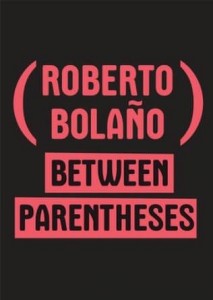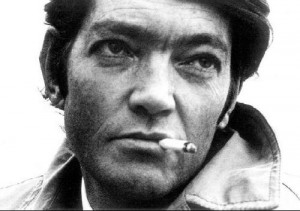Book Review: Roberto Bolaño —The Critic as Bomb Thrower
This is adversarial criticism, its eye on the martyred, fueled by grievances political and aesthetic — the return of the repressed as the comeuppance for the comfortable. No wonder Roberto Bolaño’s reviews garnered him fierce detractors as well as admirers.
Between Parentheses: Essays, Articles, and Speeches, 1998–2003 by Roberto Bolaño. Translated from the Spanish by Natasha Wimmer. New Directions, 400 pages, $24.95.
By Bill Marx
This compelling collection of non-fiction, made up of short book reviews or commentaries penned for newspaper columns, along with award-acceptance speeches as well as personal and travel pieces, simultaneously inflates and deflates the Bolaño bubble. Before the pro-Bolaño mail floods in, let me add that I use the latter term in a speculative rather than a derogatory sense—I have not read the gargantuan novel 2666, which his celebrators claim is a masterpiece, but the intermittently adolescent longueurs of The Savage Detectives convince me that the literary coronation has been rushed, at least regarding his novels. For me, Bolaño comes off best in the concentrated doses offered by his superb short stories and novellas, especially the collection Last Evenings on Earth and By Night in Chile.
In fact, Bolaño’s slap-in-yer-face criticism suggests he would toss any crown away out of comradely principle, an act of brotherhood with Latin America’s marginalized writers, the politically silenced and creatively stifled. He believes that the greatest honor for a “real writer” is to produce a book that “threatens the hormonal stability of the idiots who, upon reading it, feel an irresistible urge to string its author up in the town square.” So much for 2666 as Time’s book of the year.
This is adversarial criticism, its eye on the martyred, fueled by grievances political and aesthetic — the return of the repressed as the comeuppance for the comfortable. No wonder Bolaño’s criticism garnered him fierce detractors as well as admirers.
Most of journalism in Between Parentheses was produced after the critical success of The Savage Detectives. The pieces read as if Bolaño, once he had the spotlight, fashioned himself as a scruffy anti-hero, an avenging outlier right out of his acclaimed 1998 novel. Perhaps to spark a readership (and settle old scores), he embraces the archetypal stance of the bloody but unbowed “cornered rebel,” pleading for neglected scribblers, past and present, of oddball genius who were beaten into submission by thickheaded critics or police truncheons, victimized by a sleazy cultural/political apparatus engineered to reward writers fit to be the sterile playthings of mainstream culture.
Bolaño’s writing may garner establishment prizes, but for him recognition is at best meaningless, at worst a sell-out. “Literature has nothing to do with national prizes,” he insists, “and everything to do with a strange rain of blood, sweat, semen, and tears.” As a critic, he serves as our outré weatherman, though Bolaño is a lot better at hailing storms than he is at articulating the aesthetic values of literature’s “strange rain”— his flâneur-as-bomb-thrower produces critiques that are impressionistic rather than analytical, opinionated rather than methodical, romantic rather than modulated or discriminating. For Bolaño, the best literature is explosive—nothing else in the authorial arsenal is of much use.
Thus Between Parentheses deems with revised literary ratings and pecking orders: those familiar with the various nooks and crannies of literature in his native Chile, Mexico, Argentina, and Spain will probably get the most enjoyment out of the automatic thumbs up and down flicked at the authors as they are marched through. (Is Rodolfo Wilcock’s The Temple of Iconoclasts “one of the best books of the twentieth century?”) It is an undeniably entertaining roll call of heroes and dunces, the former led by Jorge Luis Borges and Julio Cortázar, the latter including Isabel Allende and Norberto Fuentes (“a lost soul”). He has mixed feelings about José Donoso, admires Mario Vargas Llosa, Witold Gombrowicz, and Horacio Castellanos Moya, and comes up with counter literary canons for Argentina and Chile.
Stimulating as all this “best list” chatter is, the upshot resembles the mechanical teeter-totter in Bolaño’s novels, the angels versus the goats theme becoming repetitious and cloying, not so much developed as trumpeted, with the added problem that he wasn’t given the column inches (most of the reviews are only two or three pages long) or seemed inclined to make a detailed case for his classifications and ideas. So there are plenty of tantalizing generalizations, but little to flesh them out. You can either take them or leave them. Why is Borges’ poetry more “Whitmanian” than the verse of Neruda or Vallejo? That case is never made, along with the logical scaffolding beneath a host of other intriguing statements, such as that “crime seems to be the central symbol of the 20th century.”
At times, Bolaño just dashes off something to make his deadline. Those anxious to read Bolaño on Cormac McCarthy ‘s gothic bloodfest Blood Meridian will be disappointed—it is essentially a bland plot summary (“Blood Meridian is a Western, a cowboy novel by a writer who seems to specialize in the genre.”) His comments on American writers are surprisingly limited: there’s a boilerplate essay on “realms of evil” in Moby-Dick and The Adventures of Huckleberry Finn. Given the literary hoodlum mystique of The Savage Detectives, his admiration for the Beats is predictable: nothing on Jack Kerouac, but there are homages to William Borroughs and Charles Bukowski. Philip K. Dick is hymned as “one of the ten best American writers of the 20th century, which is saying a lot,” while James Ellroy’s autobiography, My Dark Places, contains descriptions that are “the best things written in the literature of any language in the last thirty years.” What you think of these and other enthusiasms, such as a shout out for Thomas Harris’ Hannibal, may temper your faith in his proscriptions for Latin American literature.
Between Parentheses leaves you with a call to arms, but is somewhat vague about what we are supposed to be fighting for, aside from writing that resembles Bolaño’s. The Mexican writer Sergio Rodríguez González’s short story collection Bones in the Desert “is not in the adventure tradition but in the apocalyptic tradition, which are the only two traditions still alive on our continent, maybe because they are the only ones that draw us closer to the abyss.” Demanding a dip into the abyss with every book is a tall order, and to his credit Bolaño sometimes relents: in another piece he asks that Chilean literature be made into “something reasonable and visionary, an exercise of intelligence, adventure, and tolerance.” Sometimes the riskiest rebellion means supplying balms rather than explosions; a critic forgets at his or her own peril that books supply different kinds of pleasures. An admiring review of 84, Charing Cross Road suggests that he knows this.
Still, balanced observations are in short supply in this collection, which is a shame because when Bolaño relaxes, as in a perceptive piece on the art of Turgenev’s short novel Rudin, an astute appreciation of Alphonse Daudet, and a wry exploration the Greek poet Archilochus’ notion of courage, he can be a nuanced critic, aware that literary value involves more than pissing people off by limning the end of the world.
But he is driven by the pathos of failed idealism, asking that he and other writers prove their worth by producing books driven by anger and moral repugnance at Latin American authoritarianism and spiritual corruption, supplying “hammer blows of conscience” that at their best escape didacticism because they are informed by a complicating sense of futility. Yet a writer, let alone a critic, can only ask for Armageddon so often, which raises questions about whether for Bolaño criticism serves as an instrument of revenge, a sublimated form of political payback.
At one point, Bolaño explains that his writing is “a love letter or a farewell letter to my own generation, those of us who were born in the 1950s,” and who chose a leftist militancy that was betrayed by “corrupt leaders, cowardly leaders with a propaganda apparatus that was worse than a leper colony, we fought for parties that if they had won would have sent us straight to the labor camps …” The result is a “Latin America sown with the bones of these forgotten youths.” In truth, Bolano’s fiction is not so much about saying goodbye as dramatizing acts of remembrance, lending the victims of the past eternal life through literature. By dispensing justice to writers kicked to the curb by the powerful and the myopic, his criticism partakes of that same yen to readjust history.
When he recalls his short time in prison in Chile, Bolaño talks about how it gave him an unforgettable experience of “love, black humor, friendship, and the threat of death.” No wonder Between Parentheses flips from acidic combativeness to warm effusions of loyalty to a small group of the sainted, friends that serve as a shield against the tyranny of the moronic majority. There are touching, though not particularly detailed, references to literary buddies, editors, publishers and family, particularly his son, sly travel pieces ranging from a chronicle of a disastrous return to Chile to a generous depiction of Blanes, Bolano’s home in Spain. Followers of the writer will want to read through the entire collection, looking for flickers of unguarded ego behind the to-the-barricades authorial persona—less fervent fans will find ample rewards dipping in and out.
It is worth taking a careful look, not only because Natasha Wimmer’s translation evokes the conversational lucidity of Bolaño’s prose, but unexpected treasures pop up. The writer’s sympathy for the underdog, the unsung, the inevitably defeated fighter of the good fight no doubt contributed to his penning one of the most moving and insightful requiems to a literary critic (Javier Aspurúa) I have ever read. No one else has pointed out quite so succinctly how the appetite for reading and reviewing primarily serves as a defense against the boredom of the everyday: “Maybe what he expected from books, as I would like to believe now that he’s dead, was messages in a bottle or hard drugs or windows through which, on rare occasions one sees Alice’s white rabbit skim past like a lightening bolt.” There are flickers of that fantastical hare in Between Parentheses.
Bill Marx is the editor-in-chief of The Arts Fuse. For over three decades, he has written about arts and culture for print, broadcast, and online. He has regularly reviewed theater for National Public Radio Station WBUR and The Boston Globe. He created and edited WBUR Online Arts, a cultural webzine that in 2004 won an Online Journalism Award for Specialty Journalism. In 2007 he created The Arts Fuse, an online magazine dedicated to covering arts and culture in Boston and throughout New England.
Tagged: Between Parentheses, contemporary, fiction, Latin America, Natasha Wimmer, Persona Non Grata



